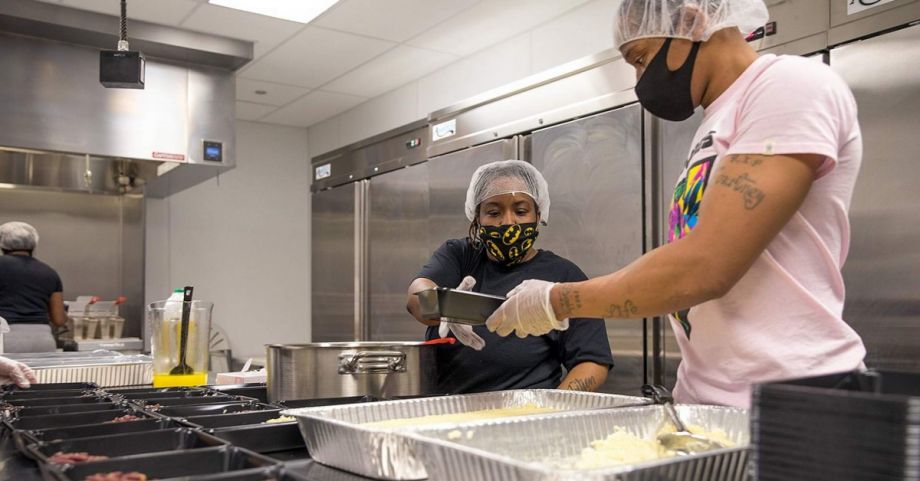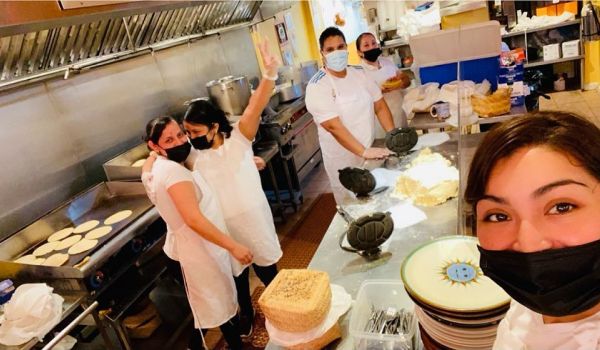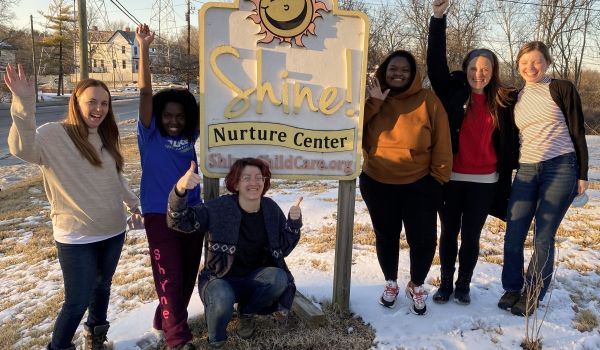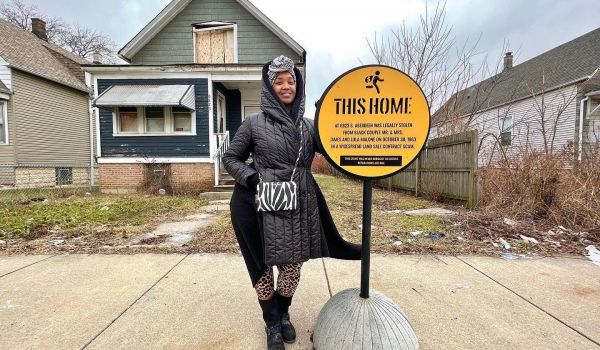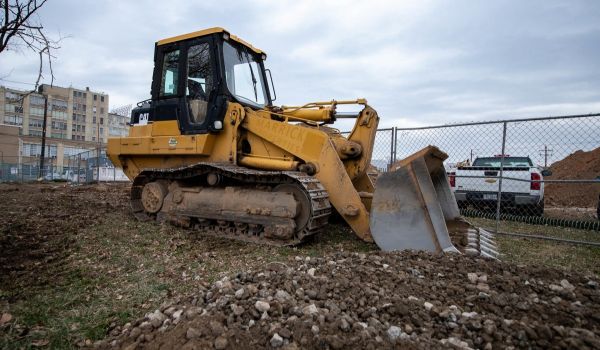ChiFresh Kitchen’s worker-owners can see their future in the building.
It’s a long, six-thousand-square-foot former corner grocery, with an arched roof and big front windows facing the corner of East 71st Street and MLK Drive, in the Grand Crossing neighborhood on the South Side of Chicago. ChiFresh Kitchen, a worker-owned commercial food services cooperative that launched just last May, bought it for $410,000 in December.
The building isn’t in great shape. They’ll need to add a commercial loading bay and do lots of structural repair. Still, this building was the favorite of all the options they looked at. It required the least interior demolition, and already had commercial fridges and freezers, even if they hadn’t functioned in years. It’s also close to where some of the founding worker-owners live.
The ChiFresh worker-owners, all formerly incarcerated individuals, envision a kitchen on one side with a meal production area in the middle, with a potential capacity of 5,000 meals produced per day and shipped to emergency food relief sites or commercial clients all over Chicago. That’s ten times the capacity they have currently in the space they’ve been renting at a kitchen incubator on the West Side of the city.
“We got a line of people that want to work with us, all formerly incarcerated, but we can’t expand in this space we’re in now,” says Sarah Stadtfeldt, one of the five founding worker-owners at ChiFresh Kitchens. “So I’m anxious for our place to get finished and to see how it’ll look in the end. We just want to expand and take off.”
They also plan to add a cafe in the front area of the new building, to serve breakfast and lunch. There’ll also be meeting rooms, offices for the co-op members, and lots of cold storage including a freezer, which will include some storage space set aside for community members to rent out for their own smaller catering or other food and beverage businesses.
Finding the money to get all that work done starts with getting a fix on just how much the co-op actually needed to acquire the property and build it out to their grand vision. Developers call it “pre-development” — getting architectural and structural analyses, estimates for demolition or repair or construction, preliminary designs and site plans, and a preliminary project timeline.
ChiFresh Kitchen was one of the first recipients of the Pre-Development Fund at Chicago Community Trust, the city’s community foundation, which provided funding and additional in-kind support to get the co-op through the pre-development phase for its new building. They’re on track to move in later this year.
“We are ready to move into our new spot, to just see the space, to have more room for production,” says Kimberly Britt, another founding worker-owner at ChiFresh. “As the days go by we are starting to get more business, this is the time we should be flourishing.”
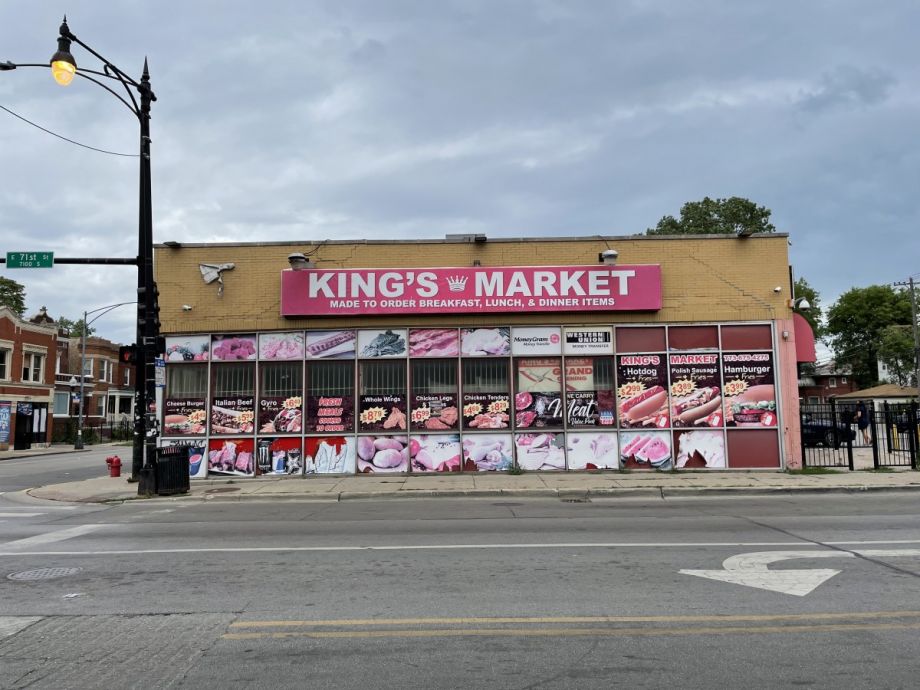
ChiFresh Kitchen's new building — which will need a lot of work but will increase the co-op's capacity by 10 times. (Photo by Oscar Perry Abello)
There are many vacant commercial buildings like this, or smaller but in similar condition, all over the south and west sides of Chicago. Some are city-owned or county-owned, and many are still privately owned, like this one. They sit vacant for a lot of reasons but it’s not for lack of community interest in reactivating them.
For older buildings, pre-development can be more work than usual, especially if the buildings have sat vacant and dilapidated for years — like the new ChiFresh Kitchen headquarters, which is a 77-year old structure, according to county records. It can become a vicious cycle. As vacant buildings slowly deteriorate, it adds uncertainty to what it would take to restore them to safe use again.
“These funds allow a level playing field for community developers, mission-driven entrepreneurs, nonprofits, and social enterprises to have the resources to do the proper planning and due diligence for these projects because when you don’t have those things, it’s problematic,” says Ja’Net Defell, who supports projects like ChiFresh Kitchen’s new building as program manager for the Community Desk at Chicago Community Trust. “If you don’t have the proper money to pay an architect to really get into the project, or to pay for cost estimates, you could underestimate your project by thousands of dollars and then you find yourself moving into construction and now you’ve got a funding gap because the cost of construction is a lot higher than what you anticipated.”
In Chicago’s historically Black neighborhoods, one of the many marks of systemic racism is the lack of liquid cash within those communities to pay for the pre-development work that would result in larger investments. Pre-development funds are the money that you need to get the real money.
ChiFresh Kitchen got just $63,500 from Chicago Community Trust’s Pre-Development Fund, but that led to ChiFresh Kitchen investing $750,000 into their new property, not to mention the additional jobs they’ll bring to the building once it opens.
Those kinds of numbers aren’t by themselves going to ring any bells downtown in celebration. But not every project is going to require multi-million dollar investments or promise triple figures in jobs created. A lot of worthwhile potential projects are just like this one — more expensive than anyone would like it to be, but still less than a million dollars in the end.
“It may not be the sexiest project, but when we start to sprinkle those types of projects in and around communities, you start to see real impact,” says Defell.
Banks often have difficulty financing projects of this size and scope in disinvested neighborhoods. The buildings appraise at values that are lower than the amount of capital needed to rehab them into usable shape. Banks typically lend only a portion of the market value of a building, so that constraint rules out many potential deals. According to county records, ChiFresh Kitchen’s new building most recently appraised at just $78,476 — even though the previous owner of the building was able to hold out for significantly more.
There are non-bank lenders who specialize in getting around the appraisal gap for non-residential properties. Based in Chicago, IFF is a community development loan fund that specializes in lending to nonprofit service providers and community-based organizations that often rely on grant funding or public funding for their work. IFF uses its specialized understanding of social services sector funding to assess how much debt an organization can take on without putting itself into financial jeopardy. But IFF works generally with nonprofits, not small businesses or co-ops.
There’s also the Chicago Community Loan Fund, which has an initiative focusing on commercial retail projects on the south and west sides of chicago. The loan fund makes long-term loans to commercial real estate developers who intend to bring in businesses, especially retailers, to commercial corridors in disinvested neighborhoods across the region.
ChiFresh Kitchen found three sources of funding: two private and one potential public. Shared Capital Cooperative, a Twin Cities-based co-op that specializes in lending to other co-ops, stepped in with a $350,000 mortgage. The Libra Social Impact Fund provided a $250,000 unsecured loan using flexible repayment terms — the co-op will pay a fixed percentage of its profits to Libra until the fund gets back one and a half times what it put in. ChiFresh is also pursuing a $250,000 grant from the City of Chicago’s Neighborhood Opportunity Fund, which pools developer fees from large-scale development in Chicago’s downtown areas.
The pre-development funds from Chicago Community Trust were essential for ChiFresh to successfully raise all of that funding, according to Camille Kerr, a co-founder and advisor to ChiFresh Kitchen. The funds allowed the co-op to get estimated rehab and renovation costs, as well as bring in an architect and also an owner’s rep — basically a project manager to coordinate with the general contractor and subcontractors to keep the project on schedule and on budget. Both the architect and owner’s rep are people of color, and they’re bringing in contractors who are people of color.
“Bringing [the owner’s rep] in made it so our Neighborhood Opportunity Fund application is more accurate, so we have an actual understanding of our budget needs and how long it’s going to take,” says Kerr.
Chicago Community Trust wants projects like this one to become a regular occurrence as a result of its Pre-Development Fund. It’s still pretty rare for community foundations to be involved in community development this way. Foundations generally have sometimes made grants to cover pre-development costs, but those have only been one-off occasions where there was a much larger project down the pike that the foundation knew it wanted to support.
The trust’s Pre-Development Fund is a standing request for proposals from eligible projects. They don’t need to generate a pipeline of projects for the trust to fund later. The projects just have to demonstrate potential for community impact and accountability.
“I also think when lenders and the city see philanthropy supporting these types of projects, that also helps,” says Defell. “Because everybody’s all about who’s in the deal, so if the Trust can lean in and support this kind of work, and at the Community Desk we do this all the time — talking to lenders and advocating for projects. It’s about relationships, it’s about trust, and it’s about understanding if the supports are around those folks for success. Other funders respond to that.”
Since launching the initiative last year, the trust has received around 70 applications for pre-development funding, and around 20 projects have been approved. One surprise has been the number of small businesses like ChiFresh Kitchen or Justice of the Pies, who have applied for and received pre-development funding so far. To ensure accountability, for-profit entities must partner with a nonprofit fiscal sponsor with ties to the community where the project is located.
“We underestimated the interest in the Pre-Development Fund beyond small real estate developers, once it became clear these dollars were also available to business owners who had real estate interest,” says Michael Davidson, senior director of community impact at Chicago Community Trust. “ChiFresh Kitchen is a great example of that, because it’s not just supporting real estate development, it’s supporting the real estate component of business development.”
Community development lenders do make pre-development loans, but those are also often made in anticipation of the lender making a much larger loan later on. And even community development lenders also typically like to work with experienced developers who they trust from previous projects, even if they’re small projects.
A developer might pay for pre-development work knowing that they’ll make that money back from renting a property after renovating it. ChiFresh Kitchen isn’t a developer. It’s just a successful small business that is growing faster than it expected and wants to own its physical space rather than renting from a developer, even a friendly developer. It could even find funders who believed in its mission and were confident ChiFresh would pay them back. The co-op just needed to figure out how much to request from lenders or from the city.
“We can create an environment the way we want it to be,” says Britt. “That’s what I’m looking forward to more than anything.”
Editor’s note: We’ve corrected the spelling of Ja’Net Defell’s name.

Oscar is Next City's senior economic justice correspondent. He previously served as Next City’s editor from 2018-2019, and was a Next City Equitable Cities Fellow from 2015-2016. Since 2011, Oscar has covered community development finance, community banking, impact investing, economic development, housing and more for media outlets such as Shelterforce, B Magazine, Impact Alpha and Fast Company.
Follow Oscar .(JavaScript must be enabled to view this email address)

